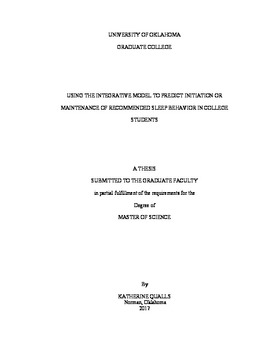| dc.description.abstract | Introduction: Sleep deprivation is a serious public health concern in the United States that often goes unnoticed, particularly among college students and young adults. Government initiatives such as Healthy People 2020 and Healthy Campus 2020 have set goals for decreasing the occurrence of sleep deprivation and the adverse effects of sleep deprivation in adults and college students. This study utilized the Integrative Model to explore the relationships between attitudes, perceived norms and perceived behavioral control for intentions towards meeting, or continuing to meet, the recommended 7-9 hours of sleep per night among college students. The purpose of this study was to explore the utility of the Integrative Model towards meeting the 7-9 hours of recommended sleep for a “maintenance group” (those who are already getting 7-9 hours of sleep) and an “initiation group” (those who are not getting 7-9 hours of sleep).
Methods: An elicitation phase was conducted with a sample from the target population (n=100) to establish all the following salient beliefs about both behaviors, for both groups: behavioral, injunctive normative, descriptive normative and control. Afterwards, an instrument was developed to measure the IM constructs related to the behavior. Once the instrument was complete, it was evaluated for face and content validity by a panel of 6 experts. The instrument was next evaluated by a convenience sample (n=48) of the target population for overall readability. The statistical methods of this investigation include multiple regression and correlation procedures to explore relationships between attitudes towards the behavior, perceived norms and perceived behavioral control and intentions to sleep 7-9 hours per night for either the next 30 days (initiation group) or the next 6 months (maintenance group). Two models of regression were used to understand the determinants of intentions (dependent variable). In models 1 and 2 the independent variables were attitidues, perceived norms (PN), and perceived behavioral control (PBC). In models 3 and 4 the indepdent variables were instrumental and experiential attiudes, injunctive and descriptive norms, capacity, and autonomy.
Results: The survey was distributed online to all students in the fall of 2016 at the University of Oklahoma, and 610 responses were used for data analysis (Maintenance=300, Initiation=310) Two rounds of linear regression were performed using a stepwise method of regression on both the maintenance and initiation groups. The most influential predictor of intentions to initiate and maintain the recommended 7-9 hours of sleep per night was PBC (model 1), and more specifically, capacity (model 2). In the first initaition model, PBC was the main predictor of intentions with an unstandardized Beta coefficient of 0.426, followed by PN with an unstandardized Beta coefficient of 0.372, and lastly attitudes, with an unstandardized Beta coefficient of 0.300. In model the standard model for maintenance, PBC was the main predictor of intentions with an unstandardized Beta coefficient of 0.482, followed by PN with an unstandardized Beta coefficient of 0.244. Together, they explain 32.6% of the variance in intentions in the standard model format.
Conclusion: Future practice should focus on increasing capacity, or self-efficacy, in college students to decrease sleep deprivation and increase adherence to CDC sleep standards. Additionally, future research should focus on the IM as a framework for targeting sleep behavior as a prospective study. | en_US |
